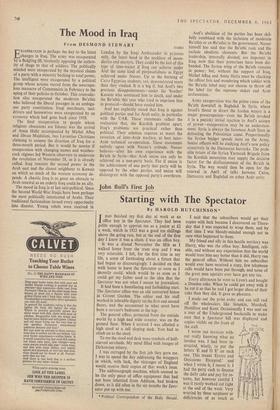The Mood in Iraq
From DESMOND STEWART
CAIRO
EXASPERATION is perhaps the key to the latest changes in Iraq. The army was exasperated by a fledgling SS, insolently opposing the author- ity of thugs to that of soldiers. The politically minded were exasperated by the mystical claims of a party with a minority backing to total power. The intelligent were exasperated by a political group whose actions veered from the unscrupu- lous massacre of Communists in February to the aping of their policies in October. This contradic- tion also exasperated the moderate Beathis who believed the liberal passages in an ambigu- ous party constitution. Iraqi merchants, taxi- drivers and housewives were exasperated by an economy which had gone back since 1958.
The final exasperation to people whose religious obsessions are Islamic was the arrival of Amin Hafiz accompanied by Michel Aflaq and Jibran Majdalani, two Levantine Christians claiming to assume the direction of Iraq for a three-month period. But it would be unwise if exasperation with changing names and weather- cock regimes led Western observers to underrate the revolution of November 18, as it is already called. Iraq remains the second power in the Arab east and the closest neighbour to Kuwait on which so much of the western economy de- pends. A chaotic Iraq is as great an obstacle to Arab renewal as an orderly Iraq could be an ally.
The mood in Iraq is at last anti-political. Since the Second World War Iraqis have been perhaps the most politically intoxicated of Arabs. Their traditional factionalism turned every opportunity into disaster. Young rebels were received in London by the Iraqi Ambassador in pyjamas only, the latest bead in the necklace of incen- diaries and martyrs. They could be the last of this type of time-waster if Iraq can achieve under Aref the same kind of purposefulness as Egypt achieved under Nasser. Up to the burning of Cairo Egyptian students, too, demonstrated more than they studied. It is a big if, but Aref's two previous disappointments—under his 'brother' Kassem who sentenced him to death, and under the Beathis this year who tried to imprison him in protocol—should have steeled him.
Aref has explicitly stated that Iraq is against political parties and for Arab unity, in particular with the UAR. These statements reflect the realisation that, the Kurdish problem apart, Iraq's problems are practical rather than political. Their solution requires at worst the cessation of inter-Arab warfare, at best inter- Arab technical co-operation, These statements entirely agree with Nasser's attitude. Nasser believes—after his own experience with the Beath in Syria—that Arab union can only be achieved on a non-patty basis. For if union is the achievement of one party that party will be opposed by the other parties, and union will disintegrate with the opposed party's overthrow. Aref's abolition of the parties has been skil- fully combined with the inclusion of moderate Ba'athis or ex-Ba'athis in the government. Nasser himself has said that the Ba'athi rank and file include idealistic elements. But the Beathi leadership, internally divided, are impotent in Iraq, now that their pretorians have been dis- banded. The Syrian wing of the Beath remains in power; but, without the support of Iraq, Michel Aflaq and Amin Hafiz must be checking the officer lists and wondering which soldier with the Beathi label may not choose to throw off the label for the supreme stakes and Arab acclamation.
Army exasperation was the prime cause of the Beath downfall in Baghdad. In Syria, where Israel's threat to divert the Jordan waters is a major preoccupation—even the Beath invoked it in a panicky initial reaction to Aref's seizure of power—exasperation may be an understate- ment. Syria is always the foremost Arab State in defending the Palestinian cause. Proportionally the Syrian budget spends most on the Army. Senior officers will be studying Aref's new policy attentively in the Damascus barracks. The prob- able return of the Syrian Yarmouk Brigade from the Kurdish mountains may supply the decisive factor for the disillusionment of the Beath in Syria. The way would then be open for the renewal in April of talks between Cairo, Damascus and Baghdad on sober Arab unity.






































 Previous page
Previous page